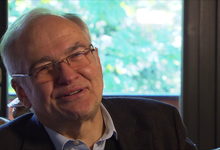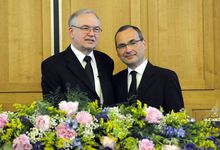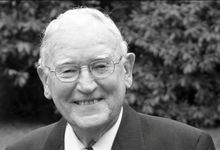Engaged in both home congregations
By the way, what has become of Chief Apostle Wilhelm Leber? He is enjoying his retirement, but is still very active—especially in his congregation, but also as a travelling speaker, and finally as the one doing the background work in the matter of reconciliation.
It is a key scene in the film biography of Chief Apostle Leber: after retiring from the management of the Church, he takes a seat in his home congregation of Buchholz in Germany. A relaxed and content smile flits across his face.
He has long since found his place in his congregation. Wilhelm Leber sings in the choir, plays the organ, and does not consider it beneath him as former president of the international Church to help with cleaning the church.
Above all, the retired Chief Apostle is happy at being able to spend most of his time at home or in the immediate vicinity: “I have wonderful memories of my active time, but I have no longing to undertake such long trips any more.”
Guest speaker at home
But sometimes Wilhelm Leber does travel, for example, to his old home town of Herford, which is located about 220 kilometres away. This is where he was born in 1947 and where he lived until he was twelve years old. But the reasons for these tours have nothing to do with nostalgia.
He accepted an invitation—and only because it came from his home congregation—to conduct lectures. At the beginning of October 2015, he gave a talk on the changes in the doctrine and in the organization that had occurred since he had taken office. His conclusion at the time: “As long as we expect the return of Jesus, the Church will continue to develop.”
And recently, at the end of October 2016, he was invited to give a talk on the reconciliation with the Association of Apostolic Churches (VAG). There is a good reason that Wilhelm Leber gave a talk on this. He was instrumental in moving this process forward—both in difficult and in better times.
Milestones of a historic process
Reaching the first milestone was difficult. An information evening in December 2007 with its historical assessment of the schism in the 1950s unleashed furious reactions. “But sometimes good comes out of the negative,” the retired Chief Apostle said. In the time following, he focused intensively on the events of that time.
Two years later already, he set a second milestone, which pointed in a better direction. “Mistakes were also made on the part of the New Apostolic Church,” the international Church leader said in 2009 during the European Youth Day. “We extend our hand in reconciliation.”
He paved the way for this reconciliation shortly before his time in ministry ended with an official release on the so-called message of Chief Apostle Johann Gottfried Bischoff. He had prophesied the return of the Lord in his life-time—and had died in 1960.
The message should never have been elevated to a dogma on account of its lack of biblical grounding, Chief Apostle Leber made clear in May 2013. He apologized to all who had suffered under this or who even turned away from the Church.
Active in retirement
Wilhelm Leber, in part during his retirement, was involved in formulating the Statement of Reconciliation, both the one that was signed in the Rhineland in the year 2014 as well as the one that is still to be signed in spring 2017.
This is how the retired Chief Apostle put the words from Matthew 5: 23–24 into practice with which he introduced his most recent talk in Herford: “Therefore if you bring your gift to the altar, and there remember that your brother has something against you, leave your gift there before the altar, and go your way. First be reconciled to your brother, and then come and offer your gift.”
Photo: Marcel Felde
Article info
Author:
Date:
Keywords:
Andreas Rother
10.11.2016
Chief Apostle,
Denominations,
Congregational life,
People/Personalities








